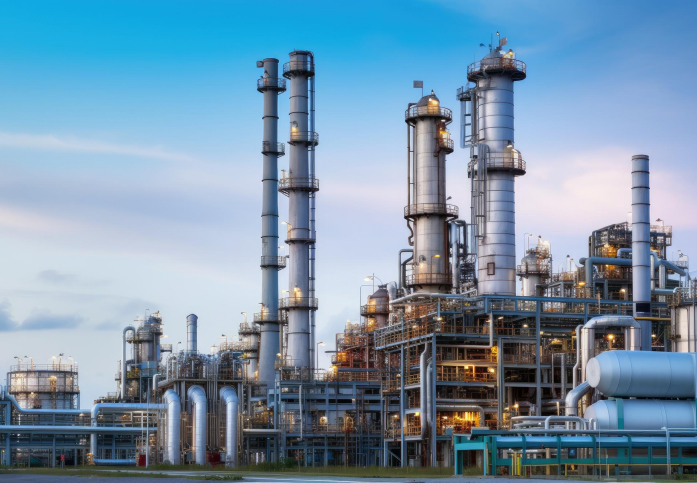Artificial intelligence (AI) is revolutionizing the dynamic oil and gas segment by optimizing supply chain processes. By leveraging AI-powered solutions, companies can accurately forecast demand, efficiently manage inventory, and streamline logistics operations. These intelligent systems analyze vast amounts of historical data, real-time weather conditions, and evolving market trends to predict potential supply chain disruptions.
Implementing AI-powered, smart oilfield technology can enable companies to proactively adjust their logistics strategies, mitigating risks and ensuring a seamless flow of resources, which is exactly what we’ll explore in this blog.
Understanding AI in Oil and GAS
AI has been transforming the oil and gas sector, offering innovative solutions to optimize operations and enhance efficiency. By analyzing vast geophysical and geological datasets, AI algorithms can accurately assess the value of specific reservoirs, tailor drilling and completion plans to specific geological conditions, and mitigate risks associated with individual wells.
Furthermore, AI-driven digital transformation in the oil and gas industry revolutionizes downstream operations. By optimizing refining processes, supply chain logistics, and product distribution, companies can significantly reduce costs and maximize profit margins.
Explore our Applied AI services today
AI Role in Oil and Gas
Predictive Maintenance
AI-powered predictive maintenance solutions like Ingenero’s utilize real-time sensor data from equipment to anticipate and prevent potential failures. This approach allows for timely maintenance, reducing downtime, optimizing equipment lifespan, and increasing operational efficiency.
Exploration and Drilling Optimization
AI algorithms process seismic data to identify promising geological formations. They also optimize drilling parameters, such as trajectory and mud weight, to minimize costs and maximize recovery rates.
Production Optimization
AI monitors real-time production data from wells to identify inefficiencies and optimize production rates. They can maximize oil and gas output by adjusting parameters like wellhead pressure and choke settings.
Safety and Risk Management
AI-powered systems analyze historical data and real-time sensor readings to identify potential safety hazards. They can also predict accidents and alert operators, enabling timely intervention and preventing incidents.
Supply Chain Management
AI optimizes supply chain operations by forecasting demand, managing inventory levels, and optimizing transportation routes. This results in cost savings, low lead times, and improved customer satisfaction.
Energy Management
AI analyzes energy consumption patterns in facilities to identify areas for optimization. It can optimize energy usage, reduce peak demand, and identify opportunities for energy efficiency improvements.
Demand Forecasting
AI algorithms assess historical data and market trends along with external factors to accurately predict future demand for oil and gas products. This enables companies to plan production, inventory, and logistics effectively.
Handling Price Fluctuations
AI-powered tools analyze market trends, geopolitical events, and economic indicators to assess potential price fluctuations. This information helps companies decide about hedging, trading, and risk management strategies.
Robotic Process Automation (RPA) for Back Office Tasks
AI-driven RPA automates repetitive tasks such as data entry, report generation, and invoice processing. This frees up human resources to focus on higher-value activities.
Enhanced Reservoir Characterization and Modeling
AI improves the accuracy of reservoir models by analyzing seismic data, well logs, and production data. This leads to a better understanding of reservoir properties, improved production forecasts, and optimized field development plans.
AI’s Advantageous Role in Advancing the Oil and Gas Sector
Better Decision-Making
AI provides data-driven insights that enable more informed decision-making. By analyzing big data, AI can identify trends, patterns, and anomalies that may not be apparent to human analysts, improving decision-making in exploration, production, and supply chain management.
Cost Reduction
AI can significantly reduce costs in the oil and gas industry. By optimizing operations, streamlining processes, and predicting equipment failures, AI can help companies save millions of Dollars. For example, AI-powered predictive maintenance can decrease unplanned downtime and maintenance costs.
Environmental Protection
The use of artificial intelligence in petroleum industry helps reduce its environmental impact. By optimizing energy consumption, minimizing emissions, and improving safety, AI can contribute to a more sustainable future. For example, AI can be used to optimize drilling operations, reducing the amount of drilling fluid and waste generated.
Competitive Advantage
By embracing artificial intelligence (AI) in the oil and gas industry, companies can gain a competitive edge. AI-powered innovations can help companies differentiate themselves, attract and retain customers, and increase market share. For example, AI-driven digital transformation in the oil and gas industry can enhance customer experiences, improve operational efficiency, and drive innovation.
Enhanced Customer Experience
AI improves customer experience in the petroleum industry by providing customized services, faster response times, and greater transparency. For example, AI-powered chatbots can provide 24/7 customer support, while AI-driven analytics can help companies identify and address customer needs.
Innovation and Continuous Improvement
AI fosters innovation and continuous improvement by enabling new ideas, experiments, and solutions. By automating routine tasks, AI frees up human resources to focus on creative and strategic thinking. AI also identifies emerging trends and opportunities, driving innovation and growth.
Future of AI in Oil and Gas
AI is transforming business models with digitalization in the oil and gas industry. Companies leverage predictive analytics to forecast market trends and refine price prediction strategies. Integration of AI in the oil and gas industry can foster environmental sustainability, boosts operational efficiency, and supports data-driven decision-making.
Advanced machine learning and neural networks are used in the oil and gas industry to tackle complex challenges. They improve data analysis for exploration and aid in pinpointing optimal drilling sites. AI-driven solutions optimize drilling productivity and support sustainable practices, making operations more efficient.
Conclusion
AI has improved the oil and gas industry by optimizing data management, decision-making, and operations. Ingenero’s AI-powered solutions in process analytics and digital transformation enable oil and gas companies to enhance exploration, production, and supply chain processes, increasing efficiency, reducing costs, and minimizing environmental impact. As AI technology advances, its potential to transform the industry is immense.
FAQs
What challenges do companies face when implementing AI in oilfield operations?
Implementing AI in smart oilfield technology and operations can be challenging due to data quality, cybersecurity concerns, and the need for specialized expertise. Additionally, integrating AI with existing legacy systems can be complex.
Are there any case studies where AI has successfully optimized oilfield operations?
Yes, several case studies demonstrate the successful implementation of AI in the oil and gas industry. For example, AI has been used to optimize drilling operations, predict equipment failures, and improve reservoir management, ensuring significant cost savings and increasing production.
Will AI replace human workers in oilfields?
While AI can automate certain tasks, it is unlikely to replace human workers completely. Instead, AI will augment human capabilities, enabling workers to focus on more complex and strategic tasks like decision-making, problem-solving, and innovation.
How can small and mid-sized oil companies adopt AI technologies?
Small and mid-sized oil companies can adopt AI technologies through partnerships with AI solution providers, cloud-based AI platforms, and open-source AI tools. They can start with small-scale AI projects, such as predictive maintenance or production optimization, to gain experience and build expertise.




